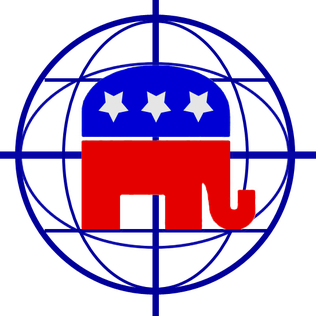
The Help America Vote Act of 2002, or HAVA, is a United States federal law which passed in the House 357-48 and 92-2 in the Senate and was signed into law by President Bush on October 29, 2002. The bill was drafted in reaction to the controversy surrounding the 2000 U.S. presidential election, when almost two million ballots were disqualified because they registered multiple votes or none when run through vote-counting machines.

The National Voter Registration Act of 1993 (NVRA), also known as the Motor Voter Act, is a United States federal law signed into law by President Bill Clinton on May 20, 1993, and which came into effect on January 1, 1995. The law was enacted under the Elections Clause of the United States Constitution. The law advances voting rights in the United States by requiring state governments to offer voter registration opportunities to any eligible person who applies for or renews a driver's license or applies for public assistance along with requiring the United States Postal Service to mail election materials of a state as if the state is a nonprofit. The law requires states to register applicants that use a federal voter registration form to apply and prohibits states from removing registered voters from the voter rolls unless certain criteria are met.

Democrats Abroad is the official organization of the Democratic Party for United States citizens living permanently or temporarily abroad. The organization is given state-level recognition by the Democratic National Committee.

Elections in the United States are held for government officials at the federal, state, and local levels. At the federal level, the nation's head of state, the president, is elected indirectly by the people of each state, through an Electoral College. Today, these electors almost always vote with the popular vote of their state. All members of the federal legislature, the Congress, are directly elected by the people of each state. There are many elected offices at state level, each state having at least an elective governor and legislature. There are also elected offices at the local level, in counties, cities, towns, townships, boroughs, and villages; as well as for special districts and school districts which may transcend county and municipal boundaries. According to a study by political scientist Jennifer Lawless, there were 519,682 elected officials in the United States as of 2012.
Voter registration is the requirement that a person otherwise eligible to vote register on an electoral roll before they will be entitled or permitted to vote. Such enrollment may be automatic or may require application being made by the eligible voter. The rules governing registration vary between jurisdictions. Some jurisdictions have "election day registration" and others do not require registration, or may require production of evidence of entitlement to vote at time of voting. In some jurisdictions registration by those of voting age is compulsory, while in most it is optional. In jurisdictions where registration is voluntary, an effort may be made to encourage persons otherwise eligible to vote to register, in what is called as a voter registration drive.
An absentee ballot is a vote cast by someone who is unable or unwilling to attend the official polling station to which the voter is normally allocated. Numerous methods have been devised to facilitate this. Increasing the ease of access to absentee ballots is seen by many as one way to improve voter turnout, though some countries require that a valid reason, such as infirmity or travel, be given before a voter can participate in an absentee ballot.

In elections in the United States, a provisional ballot is used to record a vote when there are questions about a given voter's eligibility that must be resolved before the vote can count. The federal Help America Vote Act of 2002 guarantees that, in most states, the voter can cast a provisional ballot if the voter states that he or she is entitled to vote.

Postal voting is voting in an election whereby ballot papers are distributed to electors or returned by post, in contrast to electors voting in person at a polling station or electronically via an electronic voting system. Historically, postal votes must be distributed and placed in return mail before the scheduled election day, it is sometimes referred to as a form of early voting. It can also be used as an absentee ballot. However, in recent times the model in the US has morphed, in municipalities that use postal voting exclusively, to be one of ballots being mailed out to voters, but the return method taking on alternatives of return by mail or dropping off the ballot in person via secure drop boxes and/or voting centers.

William Francis Galvin is the 27th and current Massachusetts Secretary of the Commonwealth –. He is often called "The Prince of Darkness," a nickname given to him in 1990 while serving as a state representative and running for Massachusetts State Treasurer.
Secure Electronic Registration and Voting Experiment (SERVE) was an experiment by the Federal Voting Assistance Program (FVAP) to allow military personnel and overseas citizens covered by the Uniformed and Overseas Citizens Absentee Voting Act (UOCAVA) to vote in elections in the United States via the Internet. While called an experiment, SERVE included participation from 51 counties including up to 100,000 voters and ballots cast would have been counted toward actual election results. According to the SERVE security report, there were "two groups of eligible voters: (1) American citizens living outside the U.S., and (2) military personnel and their dependents, regardless of whether they reside in the U.S. or overseas."
The House Administration Subcommittee on Elections was a subcommittee within the House Committee on House Administration, created for the 110th Congress, along with the Subcommittee on Capitol Security, at the urging of then Chairwoman Rep. Juanita Millender-McDonald. While active during the 111th Congress, the subcommittee became moribund in the 112th, holding only four hearings, the last in November 2011.

The U.S. Vote Foundation is a non-partisan non-profit 501(c)(3) voter assistance and civic tech organization that helps American citizens, domestically, overseas or in the military, participate in elections. The organization was founded as the Overseas Vote Foundation in 2005 in order to assist overseas voters in exercising rights protected under the Uniformed and Overseas Citizens Absentee Voting Act (UOCAVA). In 2012 US Vote expanded to include services to domestic voters. Overseas Vote remains an initiative of US Vote.
The following is a list of examples of electronic voting from elections around the world. Examples include polling place voting electronic voting and Internet voting.
The Overseas Absentee Voting Act, officially known as Republic Act No. 9189, is a law in the Philippines passed on February 4, 2003 which provides for a system for citizens of the Philippines currently residing or working outside of the Philippines to vote in an election. This act was a consolidation of Senate Bill No. 2104 and House Bill No. 3570, the first draft was authored in congress on July 22, 2002. The act is implemented by the Commission on Elections (COMELEC) with the help of the Department of Foreign Affairs (DFA).
The Military and Overseas Voter Empowerment Act is Subtitle H of the National Defense Authorization Act for Fiscal Year 2010 and was an act of Congress signed into law by U.S. President Barack Obama on 28 October 2009. The law amended various provisions of the Uniformed and Overseas Citizens Absentee Voting Act (UOCAVA), which was passed in 1986 to centralize all previous federal laws concerning absentee voting for military and overseas voters.
Voting rights of citizens in Guam differ from those of United States citizens in each of the fifty states. In the U.S. House of Representatives, Guam is entitled to a delegate, who is not allowed to vote on the floor of the House, but can vote on procedural matters and in House committees. Citizens of Guam may not vote in general elections for President.

Republicans Abroad was, a global political organization for Americans living outside the United States, until 2013.
This is a timeline of voting rights in the United States.







